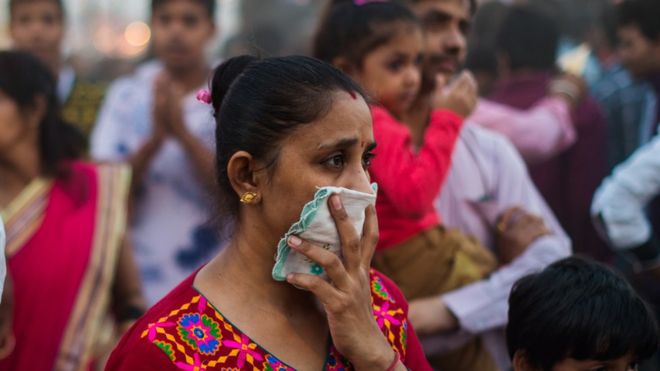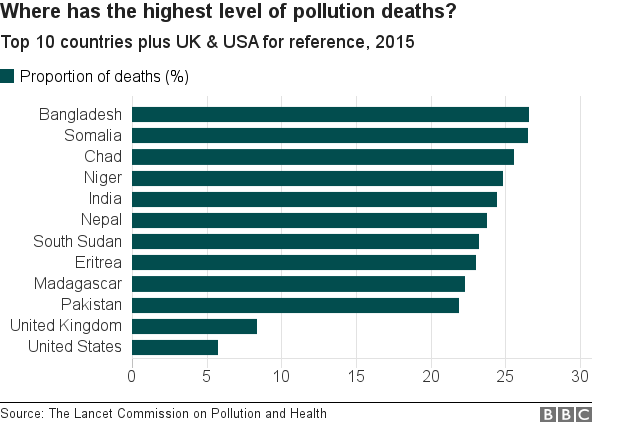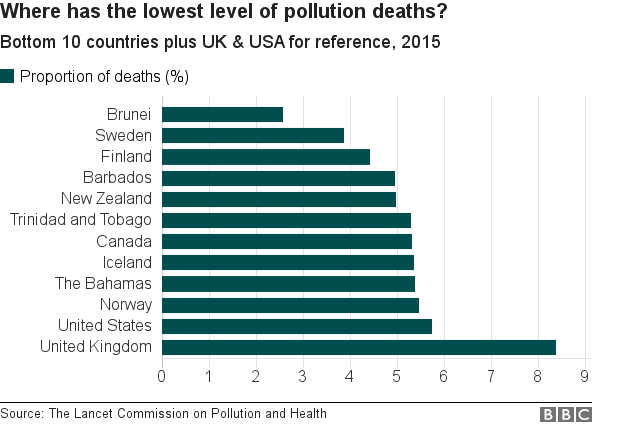88m3
Fast Money & Foreign Objects
Pollution linked to one in six deaths
By Katie SilverHealth reporter, BBC News
 Image copyrightGETTY IMAGES
Image copyrightGETTY IMAGES
Pollution has been linked to nine million deaths worldwide in 2015, a report in The Lancet has found.
Almost all of these deaths occurred in low- and middle-income countries, where pollution could account for up to a quarter of deaths. Bangladesh and Somalia were the worst affected.
Air pollution had the biggest impact, accounting for two-thirds of deaths from pollution.
Brunei and Sweden had the lowest numbers of pollution-related deaths.
Most of these deaths were caused by non-infectious diseases linked to pollution, such as heart disease, stroke and lung cancer.

"Pollution is much more than an environmental challenge - it is a profound and pervasive threat that affects many aspects of human health and wellbeing," said the study's author, Prof Philip Landrigan, of the Icahn School of Medicine, at Mount Sinai in New York.
The biggest risk factor, air pollution, contributed to 6.5 million premature deaths. This included pollution from outdoor sources, such as gases and particulate matter in the air, and in households, from burning wood or charcoal indoors.
The next largest risk factor, water pollution, accounted for 1.8 million deaths, while pollution in the workplace was linked to 800,000 deaths globally.
About 92% of these deaths occurred in poorer countries, with the greatest impact felt in places undergoing rapid economic development such as India, which had the fifth highest level of pollution deaths, and China, which had the 16th.
UK faring worse
In the UK, about 8% or 50,000 deaths are estimated to be linked to pollution. This puts the UK in 55th place out of the 188 countries measured, placing them behind the US and many European countries, including Germany, France, Spain, Italy, Denmark.
Dr Penny Woods, of the British Lung Foundation, said: "Air pollution is reaching crisis point worldwide, and the UK is faring worse than many countries in Western Europe and the US.
"A contributing factor could be our dependence on diesel vehicles, notorious for pumping out a higher amount of poisonous particles and gases.
"These hit people with a lung condition, children and the elderly hardest."
The Department for Environment, Food and Rural Affairs (Defra) said a £3 billion plan had been put in place to improve air quality and reduce harmful emissions.
A spokesman said: "We will also end the sale of new diesel and petrol cars by 2040, and next year we will publish a comprehensive Clean Air Strategy which will set out further steps to tackle air pollution."
Mike Hawes from the Society of Motor Manufacturers and Traders said the latest diesel cars were the cleanest in history. He said the biggest change to air quality would be achieved "by encouraging the uptake of the latest, lowest emission technologies and ensuring road transport can move smoothly".

In the United States, more than 5.8% - or 155,000 - deaths could be linked to pollution.
The authors said air pollution affected the poor disproportionately, including those in poor countries as well as poor people in wealthy countries.
Study author Karti Sandilya, from Pure Earth, a non-governmental organisation, said: "Pollution, poverty, poor health, and social injustice are deeply intertwined.
"Pollution threatens fundamental human rights, such as the right to life, health, wellbeing, safe work, as well as protections of children and the most vulnerable."
The results were the product of a two-year project. The authors have published an interactive map illustrating their data.
Pollution linked to one in six deaths
not good folks
By Katie SilverHealth reporter, BBC News
- 20 October 2017
- From the sectionHealth
- 184comments

Pollution has been linked to nine million deaths worldwide in 2015, a report in The Lancet has found.
Almost all of these deaths occurred in low- and middle-income countries, where pollution could account for up to a quarter of deaths. Bangladesh and Somalia were the worst affected.
Air pollution had the biggest impact, accounting for two-thirds of deaths from pollution.
Brunei and Sweden had the lowest numbers of pollution-related deaths.
Most of these deaths were caused by non-infectious diseases linked to pollution, such as heart disease, stroke and lung cancer.

"Pollution is much more than an environmental challenge - it is a profound and pervasive threat that affects many aspects of human health and wellbeing," said the study's author, Prof Philip Landrigan, of the Icahn School of Medicine, at Mount Sinai in New York.
The biggest risk factor, air pollution, contributed to 6.5 million premature deaths. This included pollution from outdoor sources, such as gases and particulate matter in the air, and in households, from burning wood or charcoal indoors.
The next largest risk factor, water pollution, accounted for 1.8 million deaths, while pollution in the workplace was linked to 800,000 deaths globally.
About 92% of these deaths occurred in poorer countries, with the greatest impact felt in places undergoing rapid economic development such as India, which had the fifth highest level of pollution deaths, and China, which had the 16th.
UK faring worse
In the UK, about 8% or 50,000 deaths are estimated to be linked to pollution. This puts the UK in 55th place out of the 188 countries measured, placing them behind the US and many European countries, including Germany, France, Spain, Italy, Denmark.
Dr Penny Woods, of the British Lung Foundation, said: "Air pollution is reaching crisis point worldwide, and the UK is faring worse than many countries in Western Europe and the US.
"A contributing factor could be our dependence on diesel vehicles, notorious for pumping out a higher amount of poisonous particles and gases.
"These hit people with a lung condition, children and the elderly hardest."
The Department for Environment, Food and Rural Affairs (Defra) said a £3 billion plan had been put in place to improve air quality and reduce harmful emissions.
A spokesman said: "We will also end the sale of new diesel and petrol cars by 2040, and next year we will publish a comprehensive Clean Air Strategy which will set out further steps to tackle air pollution."
Mike Hawes from the Society of Motor Manufacturers and Traders said the latest diesel cars were the cleanest in history. He said the biggest change to air quality would be achieved "by encouraging the uptake of the latest, lowest emission technologies and ensuring road transport can move smoothly".

In the United States, more than 5.8% - or 155,000 - deaths could be linked to pollution.
The authors said air pollution affected the poor disproportionately, including those in poor countries as well as poor people in wealthy countries.
Study author Karti Sandilya, from Pure Earth, a non-governmental organisation, said: "Pollution, poverty, poor health, and social injustice are deeply intertwined.
"Pollution threatens fundamental human rights, such as the right to life, health, wellbeing, safe work, as well as protections of children and the most vulnerable."
The results were the product of a two-year project. The authors have published an interactive map illustrating their data.
Pollution linked to one in six deaths
not good folks